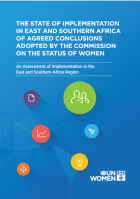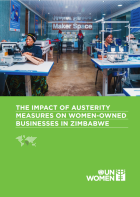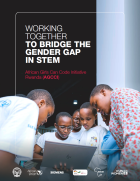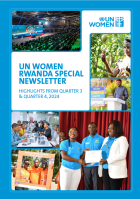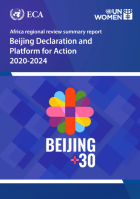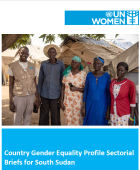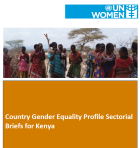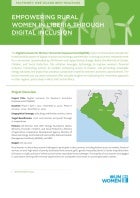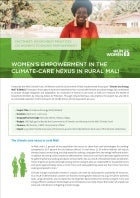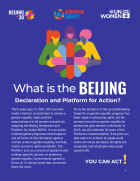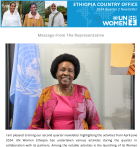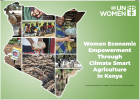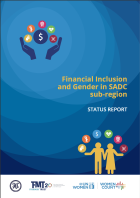Date:
The 'Gender and water (in)security in agricultural production in East Africa' focuses on the gender dynamics governing access to, use and control over rain water and irrigation used for productive livelihoods in agriculture in the countryside of Ethiopia, Kenya and South Sudan; how rural institutional arrangements and climate change impacts productive water use by women and men in agriculture, how gendered access to irrigation is impacted by the social norms that shape governance structures; and the policy responses needed to equitably respond to these gender challenges.
Date:
The Commission on the Status of Women (CSW) monitors gender equality commitments and the Beijing Declaration. A study by UN Women East and Southern Africa assessed CSW63–CSW66, finding strong treaty ratification but weak policy implementation. Challenges include inadequate funding, weak national preparations, and limited African influence in CSW negotiations. Recommendations include strengthening coordination, enhancing stakeholder engagement, and improving CSO participation to boost Africa’s impact in global gender equality discussions.
Date:
This study examines the impact of Zimbabwe’s austerity measures (2018-2023) on women owned MSMEs. Most businesses are informal, survivalist, and struggle with financial exclusion, low capital, and limited government support. Only 2 per cent export due to financial and logistical barriers. The study recommends gender-responsive policies, business formalization, financial inclusion, skills training, and export support to improve economic opportunities for women entrepreneurs.
Date:
The transition to a low carbon economy is leading to important socioeconomic transformation in sub-Saharan Africa. The green transition can help governments align their development strategies. Gender equality and women’s and youth employment are critical priorities. This toolkit helps stakeholders involved in the process of formulation or revision of climate change and green policies (i.e. NDCs or NAPs) to identify opportunities to maximize co-benefits of gender equality and climate action.
Date:
This report showcases the transformative journey that the AGCCI alumni in Rwanda have embarked on, paving way to becoming the innovators and change makers of the present and future.
Date:
This newsletter highlights some of UN Women`s key milestones made in advancing gender equality and women`s empowerment in Rwanda in the period of July - December 2024
Date:
The message that "Women’s rights are human rights" was strongly affirmed in the 1995 Beijing Declaration and Platform for Action (BPfA). Serving as a roadmap, the BPfA outlined clear objectives to tackle 12 critical issues impacting women and girls, including education, health, economic empowerment, political participation, and human rights. As the world marks the 30th anniversary of the BPfA in 2025, it serves as a solemn reminder that, despite progress, we are still far from fully achieving its goals.
Date:
While progress has been made in gender equality policies and peacebuilding, women face structural barriers. The study recommends strengthening legal frameworks, institutional structures, and socio-economic initiatives, urging collaboration among government, UN agencies, civil society, and partners to advance gender equality and women’s empowerment.
Date:
These policy briefs, form part of the Country Gender Equality Profile (CGEP), evaluates gender equality in Kenya, offering evidence-based insights for stakeholders to advance commitments to Gender Equality and Women’s Empowerment (GEWE). Guided by the EU Gender Action Plan 2021–2025, they promote inclusive, transformative approaches to inform programmes, policies, and actions, addressing diverse gender needs and advancing Kenya’s Sustainable Development Goals (SDGs) through national and county-level collaboration.
Date:
This publication is part of the WEE WCARO Best Practices series. The Digital Inclusion for Women’s Economic Empowerment (D4WEE) project in Liberia demonstrates the transformative power of digital inclusion and strategic partnerships in driving economic empowerment for rural women. Rural women face challenges to participate in the economy, including limited access to markets, financial services, or land. By connecting women to markets, enhancing access to finance, and promoting renewable energy solutions, the project leverages technology to improve women’s financial inclusion.
Date:
This publication is part of the WEE WCARO Best Practices series. The ‘‘Climate and Energy Mali” (CEMALI) project trained women in the production of improved cookstoves and sustainable fuels, reforestation activities, forestry management, and improved and efficient carbonization techniques. The project has contributed to climate change mitigation and adaptation, a reduction of women’s unpaid care work, and improved health of household members. This factsheets outlines the project's approach and results.
Date:
Gender integration in Disaster Risk Reduction (DRR) policies and frameworks across Malawi, Mozambique, and Zimbabwe remains inadequate despite progress in developing DRR plans and structures.
Date:
Thirty years ago, in 1995, 189 countries made a historic commitment to advance gender equality, rights and the empowerment of all women and girls by adopting the Beijing Declaration and Platform for Action (BDPfA).
Date:
The UN Women Kenya Annual Report highlights key achievements in advancing women’s empowerment and gender equality.
This report showcases progress in increasing women’s leadership and political participation, strengthening economic empowerment, eliminating violence against women and girls, engaging women in peace and security efforts, and enhancing planning and coordination.
UN Women Kenya remains dedicated to building a future where women are at the heart of developing resilient and sustainable communities.
Date:
This Care Framework highlights the context and challenges of women's unpaid care work in the West and Central Africa region. It also describes UN Women's approach to the care economy to address unpaid care within the context of the SDGs and the polycrisis in the region, and enabling gender equality and economic justice for rural and poor women.
Date:
UN Women Ethiopia has undertaken various activities during the quarter in collaboration with its partners. Among the notable activities is the launching of its WomenEconomic Empowerment Strategy. The strategy encapsulates UN Women’s vision of empowering women to thrive and economies to prosper. It aims to dismantle the systemic barriers that prevent women from fully participating in the economy.
Another important work done during the quarter is the continuation of our effort to ensure the participation of Civil Society organizations in the transitional justice processes. To this end, a two-day national workshop on creating space for the CSOs to participate in the implementation process of transitional justice policy in Ethiopia was held in June 2024. The workshop targets women leaders from non-governmental and CSOs and representatives of grassroots community groups aimed to assess gender sensitivity of the Transitional Justice (TJ) Policy recently adopted by Ethiopia’s Council of Ministers.
Date:
The WEE-CSA Storybook showcases the success stories of over 2,400 women from Kitui, Laikipia, and West Pokot who have transformed their lives through climate-smart agriculture. Funded by KOICA and implemented by UN Women Kenya, it highlights the project's impact on livelihoods and gender equality while sharing valuable lessons learned. This collection celebrates resilience and aims to inspire further community upliftment for sustainable development in Kenya.
Date:
This is a condensed version of the manual titled “Gender- Responsive Unpaid Care and Domestic Work Advocacy Guideline,” developed by UN Women in partnership with the Ministry of Women and Social Affairs, Ethiopia Country Office. The primary aim of this advocacy guideline is to promote gender-transformative actions addressing unpaid care and domestic work (UCDW). It emphasizes the need for increased investment in the gender-responsive care economy to advance the social, economic, and political empowerment of women and girls, thereby contributing to sustainable development.
Date:
This is an abridged version of the manual “Gender Mainstreaming in Agriculture: Training of Trainers Manual,” emerging from UN Women Ethiopia’s Women Economic Empowerment Program, in collaboration with the Ministry of Agriculture. It is funded by UN Women’s Strategic Note (2021-2025) donors: the Government of the Netherlands, the Government of Norway, and the Government of Sweden. This manual attempts to address this gap by formulating modules and sessions on relevant topics. Creating gender awareness and building agricultural gender analysis skills among agricultural, land, gender, and other related professionals and planners can contribute to gender mainstreaming in the sector, consequently leading to the equitable participation, contribution, and benefit of female farmers in the Ethiopian agriculture sector.
Date:
Women’s economic empowerment, financial independence, power and agency are facilitated through financial inclusion, using financial services and managing their own incomes. Empowering women economically drives social progress and mobility as women tend to invest their money in education and health. Financial inclusion also plays a pivotal role in achieving Agenda 2030.


